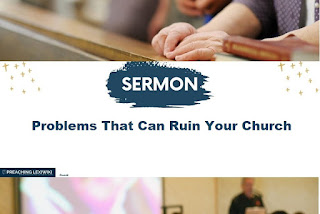Problems That Can Ruin Your Church
The early church in Corinth faced various challenges that caused division, strife, and a disregard for God's commands. As we delve into the Scriptures, let us learn from their experiences and seek wisdom and guidance in handling problems that can arise within our own church communities.
-- Ads --
I. The Problem of Division: Contentions and Jealousy
The church in Corinth faced contentions over who baptized them, leading to divisions among the believers (1 Corinthians 1:11-13). Jealousy and strife also plagued their congregation, as highlighted in 1 Corinthians 3:1-3. The seriousness of jealousy is emphasized in Galatians 5:19. These issues of division and jealousy not only hindered their unity but also hindered their witness as followers of Christ.
II. Overlooking Sin in the Church: Puffed Up and Disregarding God's Word
Another problem that arose in the Corinthian church was their failure to address sin within their community. In 1 Corinthians 5:1-5, Paul rebukes the church for allowing a man involved in sexual immorality to remain among them. They were "puffed up," proud and arrogant, refusing to listen to God's command to remove the unrepentant brother from their midst. This failure to deal with sin compromised their spiritual health and integrity as a body of believers.
III. Sin in Business Dealings: Abomination and Lawsuits
1 Corinthians 6:1-6 sheds light on yet another issue: the presence of sin in their business dealings. The Corinthian believers were taking one another to court, disregarding God's desire for them to resolve disputes within the church family. This behavior was seen as an abomination, causing damage to their testimony and undermining the principles of love and unity that should characterize the body of Christ.
-- Ads --
IV. Distorted Views on Sexual Conduct and Lord's Supper Abuse
The Corinthian church struggled with distorted views on sexual conduct, as mentioned in 1 Corinthians 6:13. They were abusing their liberties and engaging in immoral behavior that dishonored God's design for sexuality. Additionally, they had also messed up the observance of the Lord's Supper, turning it into a divisive and self-centered event (1 Corinthians 11:17-18, 22). These actions demonstrated a lack of reverence and understanding of the sacredness of these practices.
Conclusion:
The problems faced by the Corinthian church serve as reminders for us today. Division, jealousy, overlooking sin, unethical business dealings, distorted views on sexuality, and the mishandling of the Lord's Supper can all disrupt the unity and spiritual health of a church. As we learn from their mistakes, let us commit ourselves to a path of humility, love, accountability, and obedience to God's Word. May we strive to maintain unity, address sin with grace and truth, and uphold the sacredness of the practices ordained by our Lord. May the Holy Spirit guide us as we navigate the challenges that arise within the body of Christ.

